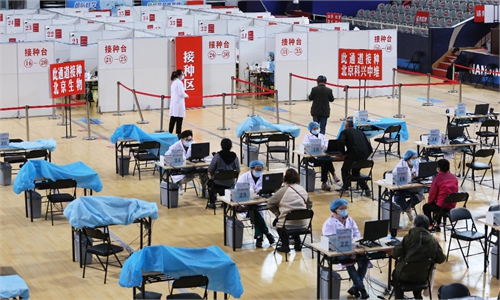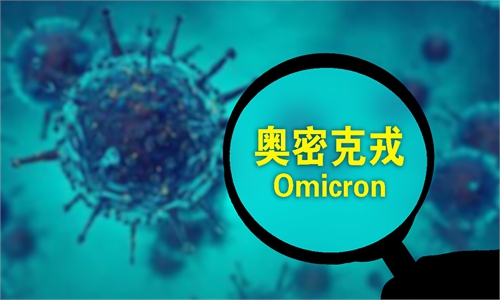
An elderly woman receives COVID-19 vaccine booster in Shanghai. Photo: VCG
From developing therapeutic vaccines to biotechnology breeding, China has mapped out measures to boost the country's bioeconomy to reach an estimated scale of 22 trillion yuan ($3.28 trillion) by the end of the 14th Five-Year Plan (2021-25) period, according to a new development plan.
The plan will be crucial in bringing leaps in development in products and services in multiple sectors of the real economy ranging from healthcare to agriculture, experts noted.
According to the development plan, which was rolled out by the National Development and Reform Commission (NDRC), China's top economic planner, China made significant achievements in the bioeconomy in recent years, and the 14th Five-Year Plan period is an important window of opportunity for the sector.
The NDRC listed the development targets of China's bioeconomy industries to be achieved by 2025. For example, the total scale of the bioeconomy will "reach a new stage," while the proportion of the bioeconomy's added value in GDP will experience stable growth.
The country should also see an "evident increase" in bioeconomy companies with annual revenue of over 10 billion yuan ($1.488 billion), the document noted.
Bai Jingyu, director of the Center of Innovation-driven Development under the NDRC, noted that China is aiming to achieve 22 trillion yuan of total bioeconomy output by the end of 2025, with core industries amounting to more than 7.5 trillion yuan, according to a report by China Central Television.
The bioeconomy includes a wide range of resources developed with biotechnology such as smart wearable products for remote diagnosis. It covers many industries such as agriculture, medicine, energy and so forth.
The NDRC also listed a number of pillar industries for the bioeconomy. For one thing, it noted that China should push the integration of advanced technologies such as genetic tests and biological heredity into disease prevention. For example, China would carry out early-stage screening tests on major illnesses like genetic diseases and tumors.
The country would also speed up upgrading vaccine research and production technologies, and develop polyvalent vaccines and therapeutic vaccines to increase China's capability in dealing with severe infectious diseases.
Tao Lina, a Shanghai-based medical observer, told the Global Times on Tuesday that it shows China's policy direction to search for "new technological routes" for vaccines, particularly those for novel infectious diseases like the herpes virus.
But he stressed that for the coronavirus, the market still tends toward traditional inactivated vaccines instead of new recombinant protein vaccines, which means that the promotion and use of new vaccines won't be easy.
Besides medical industries, China will also strengthen the application of biotechnologies to agriculture. China will accelerate the industrial application of fields like biological breeding to safeguard the supply of agricultural products, including grain and oilseeds.
China will also develop biological seed breeding technologies like genome-wide screening to increase seed cultivation abilities, the NDRC noted.
Jiao Shanwei, editor-in-chief of cngrain.com, told the Global Times that China eyes improving its agricultural production power with biotechnology, so that it does not have to rely on imported agricultural seeds.
"The technologies should be critical in safeguarding the agricultural products' stable production, thus ensuring the security of China's food supplies," he said.
Global Times



